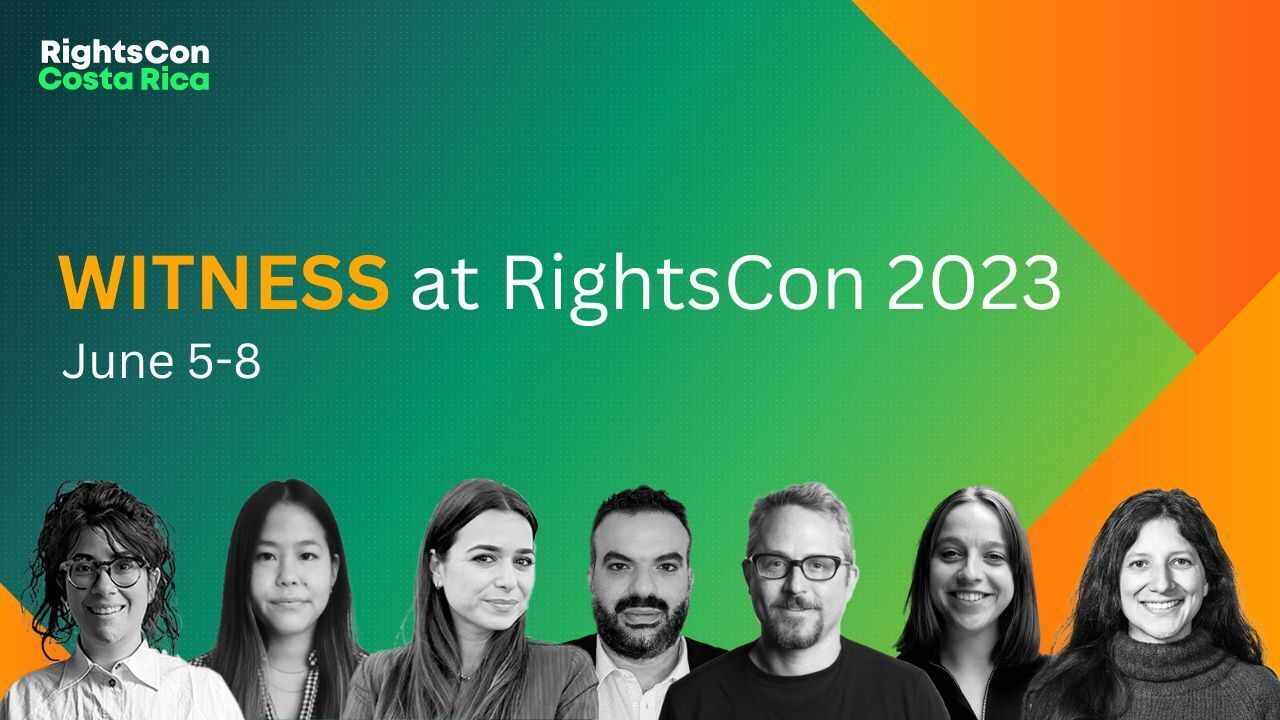WITNESS at RightsCon 2023
WITNESS is excited to once again participate in RightsCon, the world’s leading summit on human rights in the digital age!
Amid crackdowns on civil resistance, a crisis of mis- and disinformation, questions around emerging technologies like generative AI, and increasing threats to safety and security for human rights defenders around the world, the potential of video and tech to protect human rights is more important than ever.
WITNESS’ tech, legal, comms, and philanthropy experts are participating in a range of sessions – from exploring the role of technology in international criminal justice, to how deepfakes and AI will impact the future of human rights, to the importance of trust-based philanthropy practices.
See all of the great sessions that WITNESS will be participating in:
State Violence Across Borders: Racial Profiling and the Assumption of Guilt
Tuesday, June 6th | 7:45-8:45 AM CDT
WITNESS Panelist: Legal Coordinator, Video as Evidence, Georgia Edwards
From the US to the UK, marginalised communities continue to suffer due to the lack of accountability for systematic state violence and the impunity of state institutions, within and outside of its borders. Countless families demand justice from the state and wait for answers for what happened to their loved ones – a result of airstrikes, carceral systems or policing. This event will bring together three organisations working on accountability for state institutions in the US and the UK: the military, the police force and the carceral system, with the aim of reframing and streamlining a campaign for justice.
The Role of Tech Companies in the Investigation of International Crimes
Tuesday, June 6th | 10:15-11:15 AM CDT
WITNESS Panelist: Head of Law & Policy, Technology Threats & Opportunities, Raquel Vazquez Llorente
Notwithstanding the growing impact of open source information in criminal trials, witnesses—be they victims, experts, or insiders—remain a vital part of any effective international investigation and prosecution. Recognizing the need to protect witnesses, the Rome Statute of the International Criminal Court, for example, goes to great lengths to establish comprehensive, wide-ranging, and innovative systems for protecting witnesses, including specific rules and regulations concerning victims of sexual and gender-based crimes. These rules also create opportunity to examine how governments and the private sector can enhance cybersecurity literacy among witnesses, share intelligence on cybersecurity threats with accountability mechanisms, and improve the capacity of different mechanisms to identify and remediate internal and external threats.
The Future/s of Human Rights Documentation
Tuesday, June 6th | 11:30 AM -12:30 PM CDT
WITNESS Panelist: Executive Director, Sam Gregory
Providing a diverse range of perspectives from leaders in the human rights field, the session will tackle related issues such as the use of machine learning and big data in human rights information management, the emergence of social media in evidentiary investigations, the tensions and risks of under- and over-documentation, and the ever-growing precarity of documentation work under regimes, wars, and economic uncertainties. The conversation aims to draw from not only the legal registers of documentation, but also the ethical dimensions, the technological possibilities, and the sociopolitical stakes at hand.
How Can the Decentralized Web Best Support Human Right Organizations
Tuesday, June 6th | 2:00-3:00 PM CDT
WITNESS Panelist: Head of Law & Policy, Technology Threats & Opportunities, Raquel Vazquez Llorente
As legacy organizations in the human rights space, HRDAG, OpenArchive, TechSoup, and WITNESS all support different aspects of the community – from using data science and statistics to uncover human rights violations to using technology to capture, collect, and preserve human rights records.
This panel will first explore the unique ways that each organization is looking to apply decentralized web technologies to their existing work – that spans decades of fighting for accountability of human rights abuses. The crux of this dialogue will be audience participation allowing for – not only questions – but commentary and feedback regarding the possibilities and challenges of dWeb technologies in the human rights space.
Propelling People Power: Trust-Based Philanthropy in Action
Tuesday, June 6th | 3:15-4:15 PM CDT
WITNESS Panelists: Senior Program Manager, Laura Salas and Institutional Giving Coordinator, Emilee Pelletier
“Trust-Based Philanthropy” and its other iterations are becoming buzzy lingo in funding and non-profit spaces. As we face inequitable and unjust realities, communities around the world are telling us how we can best center, serve, and support them. This session will explore practices that are impactful for civil society organizations to deepen impact for frontline and grassroots activists; how we are modeling approaches in our own work that shift power; and ongoing challenges posed by an evolving human rights landscape.
Labeling Generative AI as a Creative Act
Wednesday, June 7th | 11:30 AM-12:30 PM CDT
WITNESS Panelist: Media Technologist, shirin anlen
Labeling of synthetic media, AI-generative content, and deepfakes is often seen as an unwelcome burden. Labeling is associated with mis/disinformation, considered a warning, and understood through the lens of compliance. But labeling, disclosure, and provenance can all be powerful and thoughtful creative acts that expand on the poetic and visual layers of contemporary media content. This hands-on workshop asks participants to explore the tremendous expressive potential that labeling can offer to synthetic media. Many complex questions arise when translating audio-visual information into text. As we reframe labeling into an artistic opportunity, we aim to move towards transparent, accessible, and more nuanced practices.
Are we endangering victims instead of protecting them? Tips for safe documentation in the MENA region
Wednesday, June 7th | 3:15-4:15 PM CDT
WITNESS Panelist: Programmatic Comms Coordinator, Mahmoud Elmasry
As civic space continues to shrink in the Middle East and North Africa (MENA), activists and CSOs are often forced to conduct human rights documentation from outside the region. This poses a number of issues: by seeking to assist victims of abuses by documenting and speaking out on their situation, we put them at risk of reprisals (arrest, torture, prosecution, travel ban etc.). Cases of cybersurveillance have demonstrated the importance of human rights practitioners and tech workers to work together.
The session will bring together specialists from both fields to learn from each other and identify solutions to ensure safer human rights documentation.
Fortifying Community Truth in the Age of Synthetic Media
Thursday, June 8th | 2:00-3:00 PM CDT
WITNESS Panelist: Executive Director, Sam Gregory
How can synthetic media and generative AI empower human rights defenders and community journalists? What role does each stakeholder play in helping fortify the truth coming from the frontlines? How can we ensure that this footage, oftentimes captured at great risk, is not lost in the noise of content? WITNESS works with partners on the ground globally to identify and create the solutions to these challenges. This session will be part of that exchange, and participants will become part of our global dialogue to improve existing initiatives and generate new solutions.

